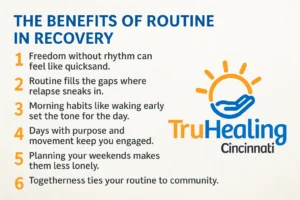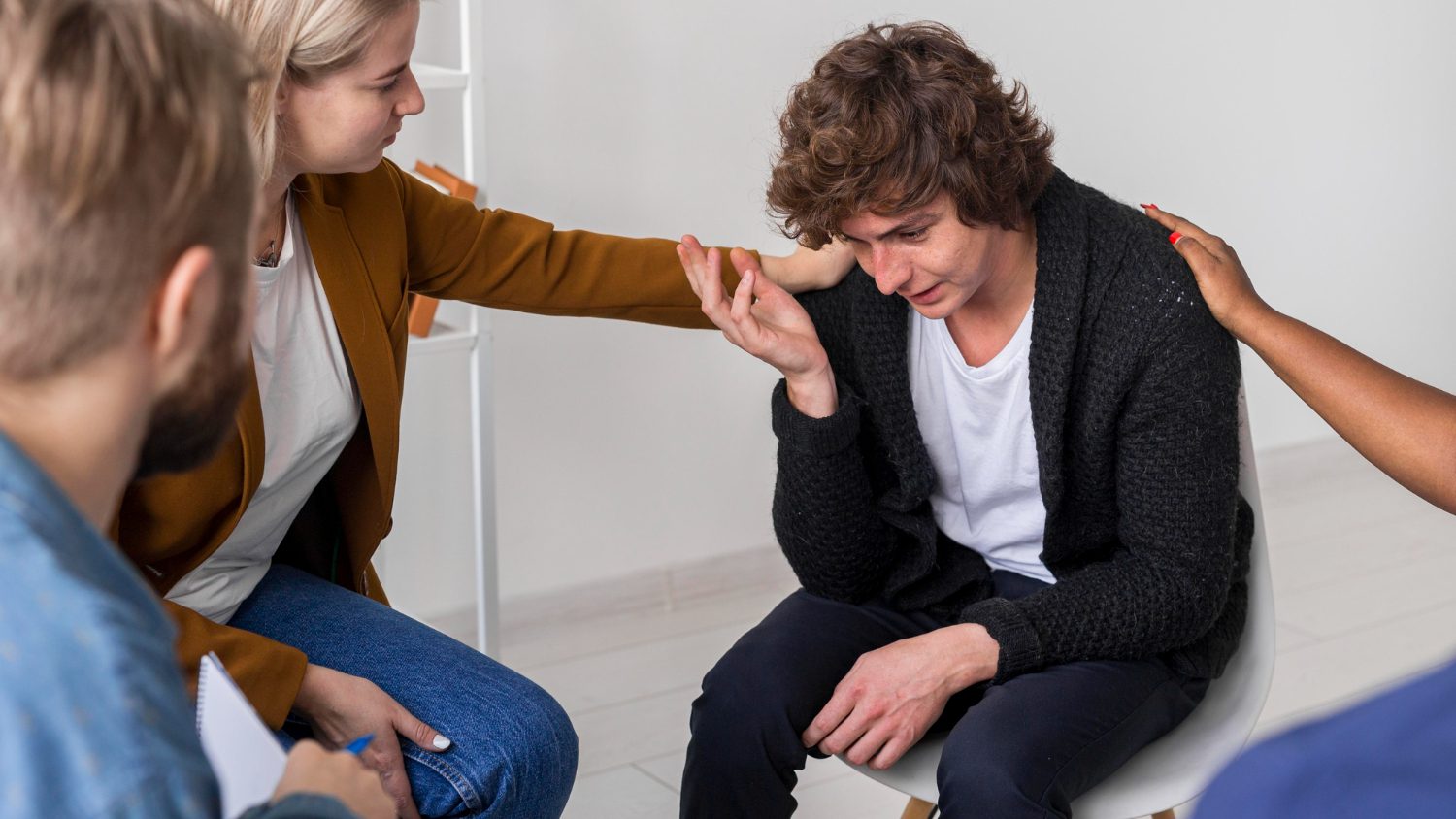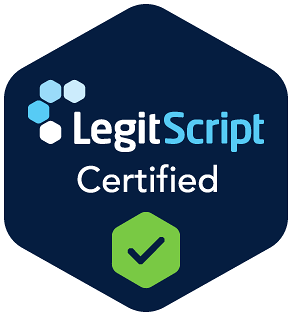Life After Residential Treatment Is Messy
Nobody warned me how strange the silence would feel after leaving treatment. Inside a Residential Treatment Program in Cincinnati, my days were mapped out: wake up, meals, group, therapy, downtime, lights out. There was rhythm. I didn’t have to figure it out—I just followed the plan.
Then came discharge. The world outside didn’t come with a schedule taped to the wall. It came with alarm clocks I could ignore, empty time I didn’t know how to fill, and nights that stretched too long. I thought freedom would feel good. Instead, it felt like quicksand.
I lasted ninety days before I slipped. My relapse wasn’t dramatic—it was quiet. A few missed routines, a few late nights, a few “I’ll be fine” lies. The slide back down was slow but steady.
Coming back was humbling. But it taught me something vital: I didn’t need perfection to stay sober. I needed a routine. Not a rigid schedule, not a military-style timetable, but a rhythm—something steady enough to catch me when everything else felt shaky.
Why Routine Matters in Recovery
Addiction thrives in chaos. Recovery needs order.
Relapse often sneaks into the cracks: the idle hours, the lonely nights, the weekends with no plans. Routine seals those cracks. It creates anchors in the day that steady you when cravings hit or shame whispers.
A routine doesn’t make me flawless. But it gives me enough stability to choose recovery—again and again. And that’s the whole point: sobriety isn’t a one-time choice. It’s thousands of small ones. Routine makes those choices easier.
My Morning Routine: Setting the Tone
Mornings used to be a blur. I’d sleep until noon, start the day already defeated, and wonder why I couldn’t get my life together. Now, mornings are my anchor.
- Wake up early. Not 5 a.m. sharp, but early enough to feel like I own the day, not the other way around.
- Make the bed. It sounds trivial, but it’s my first win of the day—a reminder that order is possible.
- Quiet time. Sometimes it’s journaling, sometimes it’s prayer, sometimes just sipping coffee in silence. The point is slowing down before the world speeds up.
If I start with chaos, I chase chaos all day. If I start with calm, I carry it with me.
Midday: Work, Purpose, and Movement
What nobody tells you is that free time can be dangerous. Without purpose, my mind drifts to old patterns.
That’s why the middle of my day has two essentials: purpose and movement.
Purpose. For me, this came through work. At first, it was part-time. Later, full-time. For others, it might be volunteering, taking classes, or pursuing art. What matters is having somewhere to place your energy.
Movement. I used to scoff when counselors said exercise helps. But they weren’t wrong. Movement gives me a release valve for the stress, anxiety, and restlessness that once sent me using. Sometimes it’s a jog. Sometimes yoga. Sometimes just walking around the block with music blasting. The point isn’t performance—it’s release.

Evenings: My Check-In Zone
Nights used to be my danger zone. The world slows down, everyone else seems busy, and cravings creep in. My routine makes evenings intentional.
- Connection. A quick text or call to someone in recovery. Nothing dramatic—just a “hey, how’s your night?” that doubles as accountability.
- Dinner without distractions. Eating real food, not numbing out with junk and a screen.
- Reflection. Writing down one win from the day. Even if the win is just “I stayed sober.”
Evenings remind me that the day doesn’t have to end in chaos. It can end with connection.
Weekends: My Old Trap
Relapse grabbed me hardest on weekends. Everyone else was drinking, posting, partying—and I was scrolling, feeling like the lonely sober kid. That loneliness cracked me open.
Now, I don’t leave weekends to chance. I plan them: a hike, a movie with a friend, a recovery meeting, even just errands with structure. Free time without direction used to wreck me. Planned time gives me safety.
Community: The Lifeline Threading It All Together
My routine isn’t just mine. It’s communal.
When I was in residential treatment, community wasn’t optional. Group sessions, meals, support—people were everywhere. After treatment, isolation tempted me back toward relapse. That’s when I realized: routine without people isn’t enough.
So I keep myself tethered through alumni programs, peer groups, and a circle of friends who know my story. Alone, I spiral. Connected, I stabilize.
If you’re outside Cincinnati, that lifeline still exists. For example, if you’re looking for a Residential Treatment Program in Lawrenceburg, Kentucky or in Louisville, programs there can help you build the same kind of community.
Relapse Didn’t Break Me—It Reminded Me
I wish I could tell you I built this routine and never stumbled again. But relapse happened—more than once. What changed was my perspective.
Relapse didn’t erase the tools I learned. It reminded me why I needed them. Each time I returned, I added something new to my routine. A different check-in. A new coping skill. More honesty.
Recovery isn’t about building a perfect record. It’s about building resilience. My routine is less about never falling—and more about knowing how to get up.
FAQs: Routines and Recovery After Residential Treatment
1. Why is routine so critical after residential treatment?
Because it fills the gaps. In treatment, structure is built in. Outside, you need to recreate it. Routine keeps the day from drifting into chaos.
2. What if I’m not a “schedule” person?
Routine doesn’t mean rigid rules. Think of it as rhythms—morning habits, evening check-ins, weekend plans. Flexibility is fine. Consistency is the key.
3. What should my mornings look like?
Anything that grounds you. Some journal, others stretch, pray, or just drink coffee slowly. The goal isn’t perfection—it’s calm and intention.
4. How do I make weekends less triggering?
Plan them. Unstructured weekends create space for cravings to grow. Build in activities—meetings, hobbies, time with sober friends—before the weekend hits.
5. What if I relapse even with a routine?
Relapse doesn’t mean the routine failed. It means it needs tweaking. Add new supports, reconnect with your treatment center, or lean into alumni programs.
6. Can I build a routine without work or school?
Yes. Purpose doesn’t have to mean a paycheck. Volunteering, creative projects, learning, or service can provide the same sense of direction.
7. Isn’t routine boring?
Routine actually gives you freedom. Without it, chaos runs your life. With it, you have stability—leaving room for joy, creativity, and real rest.
Final Word: Routine Is a Lifeline, Not a Chain
Sobriety isn’t about perfection—it’s about persistence. For me, it looks like mornings with coffee instead of chaos, afternoons with purpose instead of emptiness, evenings with connection instead of cravings.
Routine doesn’t trap me—it frees me. It frees me from the unpredictability that addiction once dictated. Every day I choose it, I choose life. And that choice, repeated over and over, is what keeps me sober.
Take the Next Step Today
If you’re ready to create a routine that makes sobriety possible long after treatment, TruHealing Cincinnati can help.
Call (888) 643-9118 or visit our Residential Treatment Program in Cincinnati, Ohio to learn more about building the foundation for lasting recovery.


